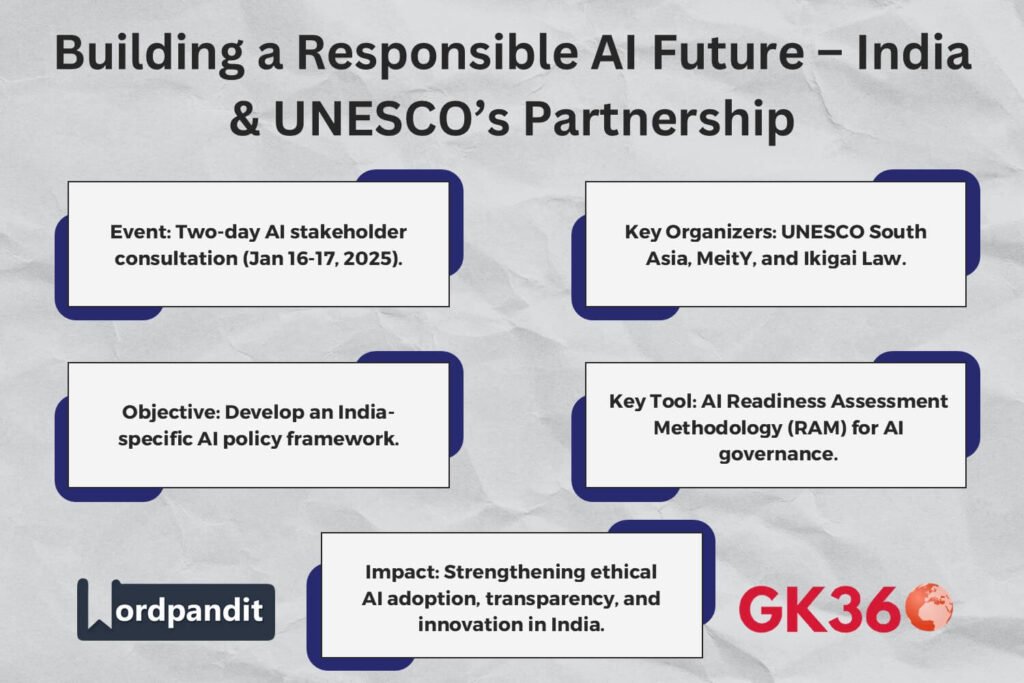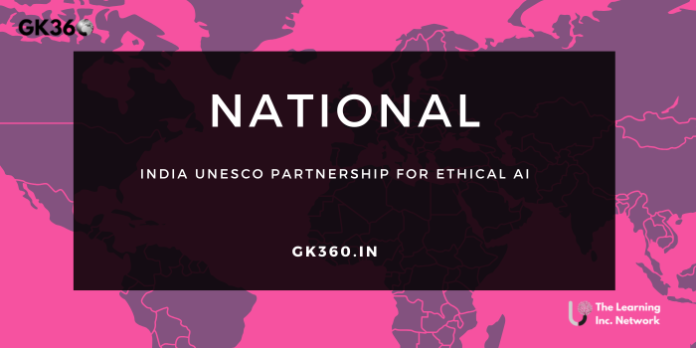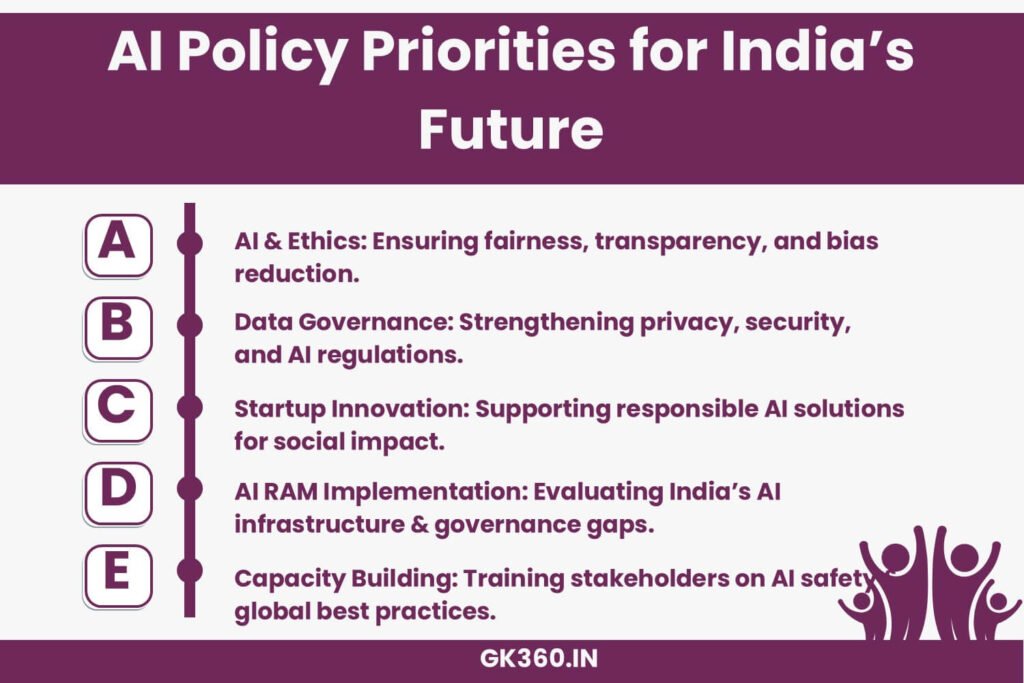India-UNESCO Partnership for Ethical AI: A Roadmap for Responsible AI Adoption
Introduction
Artificial Intelligence (AI) is transforming economies and societies worldwide. As India accelerates its AI advancements, ensuring ethical and responsible adoption becomes crucial. Recognizing this, UNESCO’s South Asia Regional Office, in collaboration with India’s Ministry of Electronics and Information Technology (MeitY) and Ikigai Law, organized a two-day stakeholder consultation on January 16–17, 2025, at IIIT Bangalore and the NASSCOM AI office. The primary objective was to develop an India-specific AI policy framework that aligns with global ethical standards while capitalizing on India’s AI strengths.

Table of Contents
- India & UNESCO’s AI Collaboration
- Key Highlights from the Stakeholder Consultation
- Alignment with India’s AI Initiatives
- Challenges & Opportunities in AI Policy Development
- Way Forward & Future of Ethical AI in India
- FAQs
- Conclusion & Call-to-Action
India & UNESCO’s AI Collaboration
Why Ethical AI Matters?
As AI increasingly influences decision-making in finance, healthcare, governance, and more, ensuring transparency, fairness, and inclusivity is paramount. UNESCO’s Global Recommendation on the Ethics of AI provides a universal framework to govern AI responsibly, emphasizing trust and accountability.
AI Readiness Assessment Methodology (RAM) & Its Importance
A key tool discussed during the consultation was AI RAM, a diagnostic framework assessing a nation’s AI ecosystem. It evaluates infrastructure, legislation, and stakeholder engagement, helping identify gaps and opportunities to enhance India’s AI governance.
Key Highlights from the Stakeholder Consultation
Diverse Stakeholder Engagement
The consultation brought together government officials, academia, industry leaders, and civil society to discuss ways to align India’s AI landscape with UNESCO’s ethical AI principles.
Startup Involvement in AI Innovation
Startups play a pivotal role in India’s AI revolution. The second day of discussions focused on fostering an innovation-friendly AI ecosystem, encouraging responsible AI solutions from emerging tech companies.
Expert Contributions & Insights
Dr. Mariagrazia Squicciarini, Chief of the Executive Office, Social and Human Sciences at UNESCO, emphasized the importance of AI RAM in evaluating a nation’s readiness for ethical AI adoption.
Alignment with India’s AI Initiatives
INDIA ai Mission & Ethical AI Pillar
India has allocated over ₹10,000 crore to its INDIA ai Mission, which prioritizes safe and trusted AI through indigenous governance tools and self-assessment frameworks.
Empowering AI Innovators
By ensuring equitable AI benefits, India aims to foster AI-driven solutions addressing societal challenges, economic growth, and quality of life improvements.
Challenges & Opportunities in AI Policy Development
Despite India’s advancements, challenges like regulatory clarity, data privacy concerns, and AI bias remain. The consultation identified solutions such as standardized AI governance frameworks and capacity-building initiatives.
Way Forward & Future of Ethical AI in India
The collaboration between UNESCO and MeitY will continue with nationwide AI RAM consultation sessions, ensuring an inclusive, multi-stakeholder approach to AI policy development.
FAQs
- What is UNESCO’s role in AI governance? UNESCO provides a global framework for AI ethics, ensuring responsible AI adoption worldwide.
- How does the AI RAM tool benefit India? It helps evaluate India’s AI readiness by identifying strengths and gaps in AI infrastructure, policies, and regulations.
- Why is ethical AI crucial for India? Ethical AI ensures transparency, fairness, and accountability, minimizing risks of bias and misuse.
- How is India supporting AI startups? Through initiatives like INDIA ai Mission, the government promotes responsible AI innovation.
- What’s next for India-UNESCO AI collaboration? Continued AI RAM consultations across India to refine and implement ethical AI policies.
Conclusion & Call-to-Action
India’s partnership with UNESCO marks a significant milestone in responsible AI adoption. By fostering inclusive, transparent, and ethical AI policies, India aims to position itself as a global leader in AI governance.
Key Takeaways Table
| Aspect | Details |
|---|---|
| Event & Organizers | UNESCO, MeitY, and Ikigai Law hosted a two-day AI consultation (Jan 16-17, 2025). |
| Main Objective | Develop a global-aligned, India-specific AI policy framework. |
| Key AI Governance Tool | AI Readiness Assessment Methodology (RAM) to assess India’s AI ecosystem. |
| India’s AI Strategy | Ethical AI development under INDIA ai Mission with ₹10,000 crore investment. |
| Challenges Identified | AI bias, data privacy concerns, regulatory clarity, and digital infrastructure gaps. |
| Future Steps | Nationwide AI RAM consultations and AI governance capacity-building programs. |
| Global Impact | Strengthening India’s role in AI ethics & governance on a global scale. |
Related Terms:
- India UNESCO AI partnership
- Ethical AI governance in India
- AI Readiness Assessment Methodology (RAM)
- India AI policy consultation 2025
- MeitY AI ethics framework
- UNESCO AI guidelines India
- INDIA ai Mission policy updates
- Responsible AI adoption India
- AI innovation and startup support
- Future of AI regulation in India






